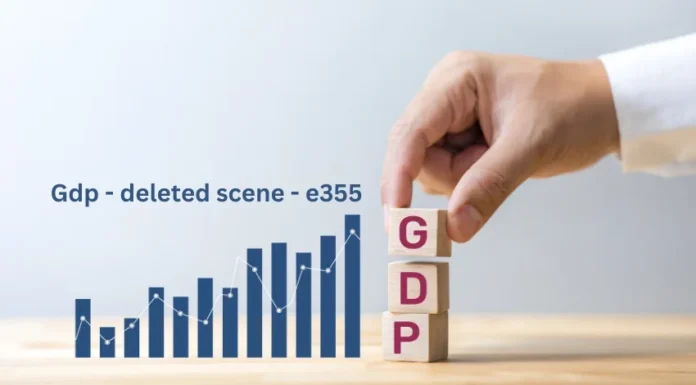GDP – Deleted Scene – E355: Unveiling the Hidden Gems of Economic Data
In the world of economics and finance, GDP (Gross Domestic Product) is a crucial indicator of a nation’s economic health. However, like a movie with deleted scenes, there are often hidden aspects of GDP that don’t make it into the final cut. This article delves into the concept of “GDP – deleted scene – e355,” exploring the lesser-known facets of economic data that are often overlooked but can provide valuable insights into a country’s economic landscape.
Understanding GDP: The Basics
Before we dive into the deleted scenes, let’s refresh our understanding of GDP:
- GDP measures the total value of goods and services produced within a country’s borders in a specific time period
- It’s calculated quarterly and annually
- GDP is used to gauge the size of an economy and its growth rate
The Significance of “GDP – Deleted Scene – E355”
The term “GDP – deleted scene – e355” refers to economic data that is collected but often not included in the headline GDP figure. The “E355” designation is a hypothetical classification for these omitted elements. Let’s explore why these deleted scenes matter:
- Comprehensive economic picture
- Potential for policy insights
- Uncovering hidden economic trends
Common “Deleted Scenes” in GDP Calculations
1. Unpaid Household Work
One of the most significant “GDP – deleted scene – e355” elements is unpaid household work. This includes:
- Childcare
- Cooking
- Cleaning
- Home maintenance
These activities contribute significantly to a nation’s well-being but are not captured in traditional GDP calculations.
2. Environmental Costs and Benefits
Another crucial “GDP – deleted scene – E355” aspect involves environmental factors:
- Depletion of natural resources
- Pollution and its impact on health
- Conservation efforts and their long-term benefits
These elements are often excluded from GDP but play a vital role in sustainable economic growth.
3. Quality of Life Indicators
GDP – deleted scene – E355 also encompasses quality of life metrics that don’t directly translate into monetary value:
- Work-life balance
- Access to education and healthcare
- Social cohesion and community engagement
These factors contribute to a nation’s overall well-being but are not reflected in traditional GDP measurements.
The Evolution of Economic Measurement
As economists and policymakers recognize the importance of these “GDP – deleted scene – E355” elements, new approaches to economic measurement are emerging:
Beyond GDP Initiatives
Several countries and international organizations are developing alternative measures that incorporate some of these deleted scenes:
- Genuine Progress Indicator (GPI)
- Human Development Index (HDI)
- OECD Better Life Index
These measures aim to provide a more holistic view of economic and social progress.
Satellite Accounts
National statistical offices are increasingly using satellite accounts to capture “GDP – deleted scene – E355” data:
- Household production accounts
- Environmental accounts
- Health satellite accounts
These supplementary accounts provide valuable information without altering the core GDP calculation.
Challenges in Incorporating “GDP – Deleted Scene – E355” Data
While the importance of these deleted scenes is widely acknowledged, incorporating them into official economic measures presents several challenges:
- Measurement difficulties
- How do you assign a monetary value to unpaid work or environmental benefits?
- What metrics should be used for quality of life indicators?
- Comparability issues
- Different countries may have varying definitions and methodologies
- Historical comparisons become difficult when new elements are added
- Political considerations
- Some countries may be reluctant to include data that could negatively impact their GDP figures
- There may be disagreements on which elements should be included or prioritized
Case Studies: Countries Embracing “GDP – Deleted Scene – E355”
Several nations are leading the way in incorporating these overlooked economic aspects:
New Zealand’s Well-being Budget
New Zealand has pioneered a well-being approach to economic policy, considering factors such as:
- Mental health
- Child poverty
- Indigenous people’s well-being
This approach aligns closely with the concept of “GDP – deleted scene – E355” by looking beyond traditional economic indicators.
Bhutan’s Gross National Happiness
Bhutan famously prioritizes Gross National Happiness over GDP, considering:
- Psychological well-being
- Cultural diversity and resilience
- Ecological diversity and resilience
- Good governance
This holistic approach incorporates many elements typically excluded from GDP calculations.
The Future of “GDP – Deleted Scene – E355”
As we move forward, the integration of these deleted scenes into economic analysis is likely to increase:
Technological Advancements
Emerging technologies may facilitate the measurement and incorporation of “GDP – deleted scene – E355” data:
- Big data analytics for capturing informal economic activities
- Satellite imaging for environmental impact assessment
- AI and machine learning for processing complex quality of life indicators
Changing Policy Priorities
As governments and citizens become more aware of the limitations of traditional GDP, we may see:
- Greater emphasis on inclusive growth
- Policies targeting well-being alongside economic output
- International cooperation on standardizing alternative economic measures
Academic and Research Focus
The concept of “GDP – deleted scene – E355” is likely to gain more attention in academic circles:
- Research into new economic models
- Development of more sophisticated measurement techniques
- Cross-disciplinary studies linking economics with social and environmental sciences
Implications for Businesses and Investors
The growing recognition of “GDP – deleted scene – E355” elements has significant implications for the private sector:
- Corporate Social Responsibility (CSR)
- Companies may need to consider their impact on a broader range of economic indicators
- Investors might prioritize businesses that perform well on alternative economic measures
- Market Opportunities
- New industries may emerge to address gaps identified in “GDP – deleted scene – E355” data
- Existing businesses might pivot to align with evolving economic priorities
- Risk Assessment
- A more comprehensive economic picture could reveal previously hidden risks and opportunities
- Investors may need to adjust their strategies based on a broader set of economic indicators
Public Awareness and Education
For “GDP – deleted scene – E355” data to have a meaningful impact, public understanding is crucial:
- Educational initiatives to explain the limitations of traditional GDP
- Media coverage of alternative economic measures
- Government communication on the importance of overlooked economic factors
As public awareness grows, there may be increased demand for policies that address these hidden aspects of the economy.
International Cooperation and Standardization
To fully leverage the insights from “GDP – deleted scene – E355” data, international cooperation is essential:
- Development of global standards for measuring and reporting alternative economic indicators
- Collaboration on data collection and analysis
- Shared platforms for comparing and benchmarking performance on broader economic measures
Conclusion
The concept of “GDP – deleted scene – E355” highlights the complex and multifaceted nature of economic well-being. While traditional GDP remains a vital economic indicator, incorporating these deleted scenes can provide a more nuanced and comprehensive understanding of a nation’s economic health.
As we move forward, the challenge lies in balancing the simplicity and comparability of GDP with the richness and depth of alternative measures. By embracing a more holistic approach to economic measurement, policymakers, businesses, and citizens can work towards creating economies that truly reflect and enhance the well-being of all.
The journey towards fully integrating “GDP – deleted scene – E355” elements into our economic understanding is ongoing. It requires collaboration, innovation, and a willingness to look beyond traditional metrics. As we continue to explore these hidden gems of economic data, we open up new possibilities for creating more inclusive, sustainable, and truly prosperous societies.







